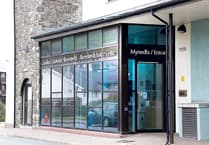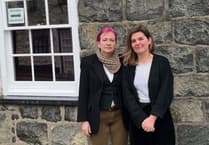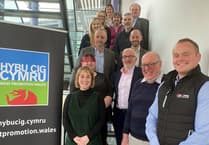Protestors against cuts to rural bus services disrupted the unveiling of a fleet of electric buses to serve a new and improved T1 route from Aberystwyth to Carmarthen.
Traws Cymru bosses and Transport for Wales (TfW) representatives in attendance assured the public they and the Welsh Government are in regular contact about how to salvage remote routes but warnedthere are no simple and immediate solutions.
The long-promoted T1 service has been held up as an example of the future of medium to long-distance bus travel across the nation.
The sustainable fleet is claimed to be a step in the right direction towards ministers’ objectives to encourage people to ditch cars in favour of public transport. Ministers want 45 per cent of alljourneys to be by public transport, walking or cycling by 2040.
But protestors questioned whether the hemorrhaging of buses serving rural areas will be a far greater challenge to achieving the Welsh Governments’ targets and climate pledges – because it willleave remote areas stranded and force residents into cars.
First Cymru won the tender to operate the new T1 route and showcased its fleet at Aberystwyth Bus Station today. The new buses and a purpose-built garage in Carmarthen have been funded by the Welsh Government and cost £4.8million.
But scores of protestors vented their anger at a time when other bus routes across mid Wales, particularly in rural areas, have been sacrificed with providers failing to contend with rising operating costs and low passenger numbers - while subsidies from national or regional authorities appear not to be forthcoming.

Resident and bus user Lindsey Elson said: “The bus is a real life line when you're without a car. Your life is a completely different format, you cannot do the things drivers do.
"You can’t do the simplest of things, like if you run out of something, you can’t just nip in the car and go down to the shop.
"You have to plan your whole life around the bus service. If it’s a rotten service, that makes a rotten life.
“This goes for all people, whether they’re disabled, children, adults working at any age. We feel totally isolated, like we’re second class citizens. Over Christmas I felt I was demoted from second class to sub human.
"I actually emailed my MP about it, because we had days through Christmas and the new year where there was a two hourly service which finished early in the evening. Some places didn’t have anything at all. We were prisoners from before Christmas to way after the new year.”
Ceredigion County Council said more cuts to bus routes in rural Ceredigion are ‘highly likely in the short term’ because of crippling cost increases.

Another regular user David Purdun said: “Borth is one of the important tourist centres in Ceredigion. Right now, the 512 has been cut by 50 per cent - and even before that they stopped running buses on Sunday as well as bank holidays. Imagine being a tourist with no buses running on a Sunday or bank holiday. It’s crazy.
“The bus services we have are run by a commercial company, and it’s commercial decisions that are dictating the policy. They’ve cut our buses saying ‘the footfall of passengers fell during lockdown’ but the passenger numbers have come right back up since then, the buses are really crowded. It’s not being run as a public service, it's being run as a commercial service.
“I’d happily take higher taxes to know that there was a free public bus service open to all.”
Communications business partner for TtW Jane Purdie hinted that flexi services and increased Welsh Government franchising were potential solutions to the problems facing bus servicesnationally, as outlined in last year’s One network, one timetable, one ticket white paper.
She told the Cambrian News: “This is a wider view and is about Welsh Government policy.
“But you’ve presumably seen the plan for potential franchising of services but they’re not quick solutions.
“The other services we work with are some of the flexi services in rural areas which potentially could be one solution.
“We work very closely in partnership with bus companies and bus operators and they have been put in areas where there wasn’t a bus service or one has been removed – and again it was a Covid response but could be expanded much more into other areas, but we’ve got to have the funding.
“We want to drive people to public transport and get that modal shift. So we encourage people to get onto public transport so we can create more services.”
Programme manager for Traws Cymru Gethin George said he could not provide answers to the specific concerns of protestors as they fell outside of his remit.
“(The T1) is a rural service in reality but it’s not for me to comment because our responsibility as an organisation is delivery on behalf of the Welsh Government,” he said.
“But the T1 recovers the pre-Covid hourly service, the standard of vehicle is far better with loads of new technology on board. They’re zero carbon and zero emissions.
“Audio-visual on board, far better seating and phone charging so it’s about bringing it on par with what you’d expect from a train-service in terms of comfort level.
“We have a target to decarbonise the whole fleet by 2026 and we operate about 11 or 12 services across Wales – the majority of which are rural services.
“The deputy minister spoke last week about how things are going to get worse before they get better.
“These projects don’t just magically appear – I wish they did. The position on electricity costs when we started this 18 months ago is very different to the position today.
“This (new T1 service) is the utopia and what we’re aiming for but the rest of the Traws Cymru network is not to this standard and that’s because investment in the fleet has not happened yet.
“It’s a gradual investment because lots of contracts are with local authorities and we have Welsh Government transition happens as and when those contracts expire. We work with about seven or eightoperators across Wales.
“I’m not going to comment from a Welsh Government perspective but what we can do from a Transport for Wales perspective is to do the very best within the limits we have is to get the services to a point where they operate as regularly as they can.
“Traws Cymru is ultimately a long-distance service and is not responsible for local services but we will be looking at what the strategic opportunities are.
“If the direction came from the Welsh Government that we were supposed to do something (about service cuts), then we would respond.
“Ultimately, the challenge is that service recovery off the back of Covid has been very difficult – recovery rates vary massively across the country – so we can put services on but we need somerevenue to be coming back in for the running of that service.”
Ms Elly Foster: “The bus services shouldn’t be run as a business, the whole public transport system should run as a fully subsidised, affordable and integrated system. They do this in Luxembourg, all their public transport is free, it’s paid for by the taxpayer. If they can do it in Luxembourg, why can’t we do it in Wales?”
“I don’t see the situation getting better, the T1 is fantastic but they spent four and a half million on it, whilst nothing else had anything.”
Lee Waters MS, Deputy Minister for Climate Change, said when the white paper was released: "Buses are the backbone of our public transport service. They carry three times as many passengers as trains, getting people across Wales to work and school, allowing us to meet family and friends, and offering a key lifeline for the quarter of people in Wales who do not have access to a car.
"Governments have long recognised the importance of this public service, even before the COVID-19 pandemic we invested well over £100 million every year in bus services. However, the legacy of privatisation still prevents us from planning buses as a public service and designing networks to ensure that investment gets people where they need to go.
"That isn’t good enough.
"The scientific advice on Climate Change is as clear as it is stark. We have to make urgent changes to the way we live and take meaningful action to avoid catastrophic damage to our climate.
"Transport accounts for nearly a fifth of our carbon emissions, yet we cannot currently plan bus networks to break our reliance on private cars and make sure people can access services reliably and sustainably. This is a key barrier to delivering a just transition to net zero.
"This white paper sets out our plan to fundamentally change the way bus services are planned in Wales – allowing all levels of government in Wales to work together to design the bus networks our communities need."
The Cambrian News has contacted the Welsh Government for comment.



